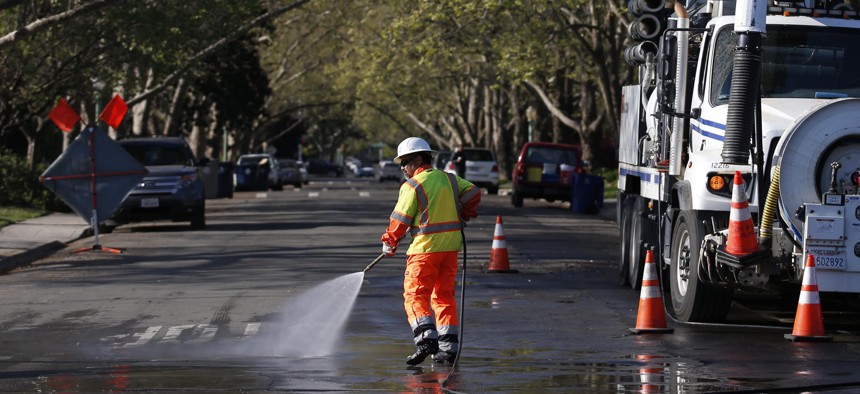The States With the Worst Public Sector Job Losses During the Coronavirus Crisis

A city utility worker washes down a street in Sacramento, California in March 2020. AP Photo/Rich Pedroncelli, File
Forty-nine states have had declines in state and local government employment since February. Some have fared worse than others.
In nine states, more than one-in-10 state and local government jobs have been lost since the coronavirus pandemic began battering the nation’s economy earlier this year, according to a new analysis.
Job losses in state and local government during the course of the pandemic—from March through June—have totaled about 1.5 million, estimates from the Bureau of Labor Statistics show. The liberal-leaning Economic Policy Institute this week issued a report that looks at those losses in each state, using figures that the bureau released this month.
Tennessee was the only state where state and local employment hasn’t declined during the public health crisis, according to the report. The group found that the 49 other states experienced some declines when comparing February job levels to those in June.
States with declines of at least 10% in their state and local workforce include: Wisconsin (-12.3%), Massachusetts (-11.9%), Connecticut (-11.4%), South Dakota (-11.3%), Hawaii (-10.8%), Minnesota (-10.6%), Illinois (-10.5%), Maine (-10.5%) and Kentucky (-10.2%).
The states with the greatest number of state and local public sector job losses, comparing June to February, were: California (-229,000), Texas (-112,100), New York (-80,400), Illinois (-79,100) and Ohio (-57,500).

The EPI report notes that prior to the pandemic, 21 states and Washington, D.C. had fewer state and local public sector jobs than in July of 2008, around the time the Great Recession hit.
In June, state and local government employment was more or less flat after heavy losses in the preceding months. The nation’s total non-farm payrolls increased by about 4.8 million in June.
Even so, joblessness remains at record highs. New claims for unemployment benefits totaled 1.43 million last week. This marks the 19th straight week the claims have cleared one million.
Many of the state and local government job losses are education-related. K-12 schools, along with public colleges and universities have seen their normal operations upended by the virus outbreak. Reopening plans for schools remain a work in progress. They vary from state-to-state, and at this point often involve online classes and other remote learning options.
Meanwhile, states and localities across the country are scrambling to deal with tax and fee revenues that are short of prior expectations as the coronavirus stifles a wide range of economic activity.
To keep their finances in order, cities, states and counties are resorting to a mix of temporary and permanent job cuts, furloughs and hiring freezes, along with other spending reductions.
Mayors, county officials and governors have been pressing Congress for an infusion of financial aid to help their communities deal with the coronavirus crisis.
Any additional funding would come on top of about $200 billion in assistance for states, localities, schools and higher education institutions that was included in an earlier relief law. A main pot of that previously approved money, worth $139 billion, came with restrictions state and local leaders have complained about and also didn’t go directly to smaller local governments.
Republicans, who control the U.S. Senate, haven’t lined up behind a new state and local aid package, although they did propose $105 billion to help reopen schools.
A House bill backed by Democrats would provide about $900 billion in aid to states, localities, tribes and territories.
New York City Mayor Bill de Blasio said this week that following through with the Senate Republicans’ relief plan would force his city to lay off as many as 22,000 municipal workers.
Some economists and others have warned that sharp cuts to state and local spending and jobs could hamper the nation’s economic recovery.
That said, support among state officials for more federal aid is not ubiquitous.
A group of about 200 state legislators from around the country signed onto a letter this week opposing a new federal “bailout” of states. The letter was organized by the American Legislative Exchange Council, a group that generally promotes limited government policies.
A full copy of the EPI analysis on state-by-state job losses can be found here.
Bill Lucia is a senior reporter for Route Fifty and is based in Olympia, Washington.
NEXT STORY: The End of Open-Plan Everything






